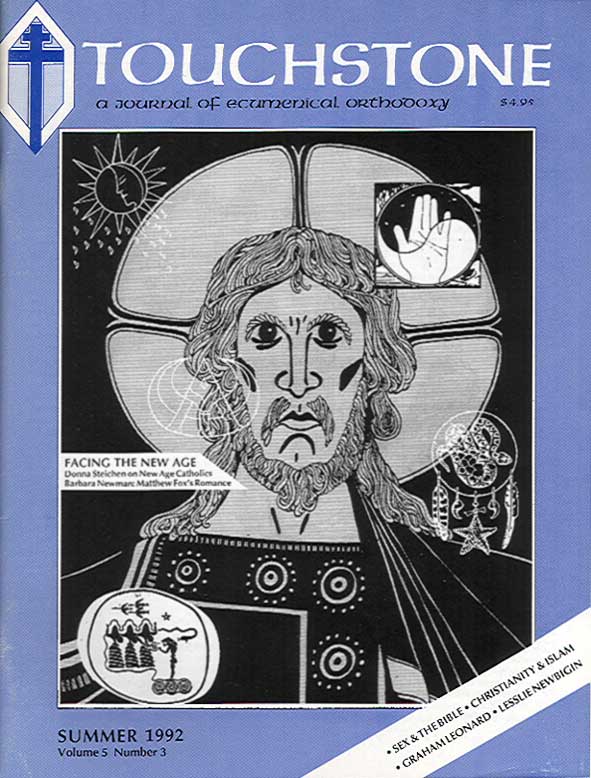The Gospel as Public Truth
by Lesslie Newbigin
The Gospel is an account of things that have happened. It is not a proposition in metaphysics or a program for ethics and politics, though it has implications in both these spheres. It is narrated history, and (like all narrated history) it is told with a belief about its meaning. This belief is that the story tells what God has done for the redemption of all creation and its reconciliation to the source of all being.
The story is made available to us through the living memory of the Church, the community which from its beginning has been enabled by the work of the Holy Spirit to recognize in Jesus the one sent by the Father for the salvation of the world. This community has kept the memory alive by preserving, cherishing, and handing on from generation to generation the earliest records of Jesus, the words and acts of the earliest witnesses, and the body of writing that was sacred Scripture for the Jewish people and therefore for Jesus and his disciples and that tells the story for which the ministry of Jesus is the hermeneutic key. This whole corpus of writings has been recognized and accepted by the Church as providing the norm by which subsequent developments in the interpretation of the Gospel and of its implications are to be tested.
The first communicators of the Gospel were the eyewitnesses who could say: "That which we have seen and heard . . . we declare to you." They were well aware that their story could be and would be rejected, and that only the word of the Holy Spirit could convince people of its truth. But they did not draw the conclusion that its truth was a private matter for the individual. They did not avail themselves of the protection that Roman law provided for the exercise of religions of personal salvation. They affirmed that the message which had been entrusted to them was one which concerned the destiny of the whole human race. The one who had died and risen again was the savior and judge of the world. The news was of vital concern to every human being. It was public truth. Fidelity to it required the momentous decision to withhold acknowledgment of the emperor as supreme power. They accepted the price which had to be paid for this fidelity.

To affirm the Gospel as public truth does not mean, therefore, that belief in the truth of the Gospel is to be ensured by the use of political power. It has been made clear from the beginning, though often forgotten in subsequent centuries, that the form of the affirmation is given once and for all in the witness which Jesus bore in his dying. The fact that the cross is at the heart of the Gospel, and that it was the powers of state, Church, and popular opinion that sought to silence the divine word, must forever forbid the Church to seek an identification of the Gospel with political power. But the Gospel, the good news with which the Church is entrusted, is that God raised the rejected Jesus from the dead and that he is now alive and at work in the community which he sent forth to tell the story. This means that he is the rightful bearer of God's rule even though that rule is now veiled in weakness. With all its weakness, sinfulness, and compromise, the Church is the body entrusted with the responsibility of bearing witness to the fact that the one whom Jesus called Father is the Lord and will be the judge of all without exception. This is public truth.
In contemporary "modern" culture, the model of public truth is to be found in timeless lawlike statements, ideally capable of being stated in mathematical form. From its early roots in Greek thought this model has been powerful in European culture. Perhaps the most important example is to be found in the enormous influence of the work of Isaac Newton on the thinkers of the "Age of Reason" in which modern Western culture was shaped. Since that time it has been common to identify "public truth" with matters which can be stated in this from. The word scientific is used to distinguish knowledge of this kind from claims to know which rest on faith. What is forgotten is that the entire "scientific worldview" rests on assumptions that are accepted on faith but cannot be proved true otherwise than in the actual practice of science. To affirm the Gospel as public truth is to invite acceptance for a new starting point for thought, the truth of which will be proved only in the course of a life of reflection and action that proves itself more adequate to the totality of human experience than its rivals. To claim that the Gospel is public truth is, therefore, certainly not to seek some kind of dominance for the Church. It is to embark on a journey of faith that looks for final justification only at the end. It is not to seek for the Gospel any coercive power in the arena of public debate but it is to insist that the Gospel must be heard as an affirmation of the truth which must finally govern every facet of human life. It is not to ask that the Gospel should exclude all other voices, only that it should be heard. The universal recognition that Jesus is Lord is something promised for the end, not for the present age.
To affirm the Gospel as public truth is not to assert dominance but to invite dialogue. The announcement of things that have happened is not the fruit of dialogue but its starting point, for the meaning and implications of what is announced have to be learned in dialogue. For news of things that have happened we depend upon competent witness. Dialogue is not a substitute for reliable information. The first responsibility of the Church is to give faithful witness to the things that have happened. But this must lead on to dialogue, for the witnessing community does not know in advance what the message will entail, what will be the consequences of its acceptance in the several areas of human life. The New Testament itself shows that the Church, as it moved out from its roots in Israel to all the nations, had to learn (and be surprised by) what its implications would be (e.g., Acts 10 and 11). In the same way the Church has to learn what the implications of of the Gospel might be for the worlds of, for example, economics, education, and healing. This can only come about through dialogue in which, as Jesus promised, the Church must learn new things (John 16:12-15). And it is important to remember that, in this same context, Jesus told his disciples that they must expect hostility and rejection. The Church must not aspire to any other kind of authority than that of the crucified and risen Jesus. The final "Proof" of the thesis can only be at the end of history, at the final consummation of which the resurrection of Jesus is pledge and firstfruit.
The starting point is the Gospel itself, the narrative of those events in which the Author of all being has acted to redeem and reconcile an alienated creation and to direct it towards its true end. And since the superabundant grace and glory of God surpasses all our powers of thought and imagination, we may confidently expect and pray for new understandings of the scope of God's purpose for our society and new energy for doing our part in it. •
This statement was issued to participants at the Swanwick Consultation, July 1992, in England, a conference of 400 men and women to develop "realistic strategies for Christian action to penetrate areas of public life with the gospel." It is reprinted here in shortened form by permission.
Lesslie Newbigin (1909-1998) was a British theologian, missiologist, missionary and author. Though originally ordained within the Church of Scotland, Newbigin spent much of his career serving as a missionary in India and became affiliated with the Church of South India and the United Reformed Church, becoming one of the Church of South India's first bishops. A prolific author who wrote on a wide range of theological topics, Newbigin is best known for his contributions to missiology and ecclesiology.
subscription options
Order
Print/Online Subscription

Get six issues (one year) of Touchstone PLUS full online access including pdf downloads for only $39.95. That's only $3.34 per month!
Order
Online Only
Subscription

Get a one-year full-access subscription to the Touchstone online archives for only $19.95. That's only $1.66 per month!
bulk subscriptions
Order Touchstone subscriptions in bulk and save $10 per sub! Each subscription includes 6 issues of Touchstone plus full online access to touchstonemag.com—including archives, videos, and pdf downloads of recent issues for only $29.95 each! Great for churches or study groups.
Transactions will be processed on a secure server.
more from the online archives

33.2—March/April 2020
Christian Pro-Family Governments?
Old & New Lessons from Europe by Allan C. Carlson
calling all readers
Please Donate
"There are magazines worth reading but few worth saving . . . Touchstone is just such a magazine."
—Alice von Hildebrand
"Here we do not concede one square millimeter of territory to falsehood, folly, contemporary sentimentality, or fashion. We speak the truth, and let God be our judge. . . . Touchstone is the one committedly Christian conservative journal."
—Anthony Esolen, Touchstone senior editor








